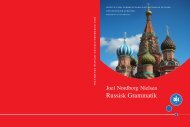[hprints-00683151, v2] Enea Silvio Piccolomini (Pius II ... - Hprints.org
[hprints-00683151, v2] Enea Silvio Piccolomini (Pius II ... - Hprints.org
[hprints-00683151, v2] Enea Silvio Piccolomini (Pius II ... - Hprints.org
Create successful ePaper yourself
Turn your PDF publications into a flip-book with our unique Google optimized e-Paper software.
<strong>hprints</strong>-<strong>00683151</strong>, version 2 - 19 Mar 2013<br />
fathers, Archbishop Pizzolpasso of Milan 52 who became a friend and mentor of<br />
<strong>Piccolomini</strong>, helped him to obtain a prebend in Milan, and asked him to give his<br />
second oration at the Council of Basle, i.e. a sermon on the feastday of Saint<br />
Ambrose. <strong>Piccolomini</strong> may actually have met both Bruni and Guarino when, as a<br />
student, he visited Firenze and Ferrara. In a letter of 1434, two years before he gave<br />
the oration Audivi, he mentions them, together with Ambrogio Traversari, as<br />
contemporary luminaries of scholarship 53 , and he praises both of them in later<br />
writings 54 . Keeping in touch with the humanist network in Italy was not easy for<br />
someone living North of the Alps, but these early quotations show that it mattered<br />
to <strong>Piccolomini</strong>.<br />
<strong>Piccolomini</strong>s rhetorics have been studied by Johannes Helmrath in his impressive<br />
work on oratory at the German diets 55 and by Albert Baca 56 . A major study on the<br />
subject is, however, still outstanding.<br />
4.4 Minor themes<br />
A number of minor themes in the text may be highlighted here.<br />
4.4.1 The origins of the Turks<br />
The conception of the Turks as descendants of the Troians goes back to the Middle<br />
Ages, in particular to a genealogy of the Frankish kings in the Chronicles of Fredegar<br />
from the 7 th century and to a note in the Gesta Francorum of the 12 th century. 57<br />
It was picked up in a text from 1345 purporting to be a letter from Umur Pasha<br />
(Morbisanus) to Pope Clement VI as a reaction to a crusade attack on Izmir. The<br />
letter was written in Italian and later translated into Latin and other languages. Over<br />
52 Iaria, p. 5, 23<br />
53 <strong>Piccolomini</strong>: Der Briefwechsel, I/1, 28-29 (ep. 16)<br />
54 I.e. in the section on Leonardo Bruni in his De Viris Illustribus, where he even directly mentions Guarino’s translation<br />
of Plutarch’s work, De alendis liberis, p. 35, cf. Iaria, p. 5, and in his Commentarii<br />
55 Helmrath: Reichstagsreden<br />
56 Baca<br />
57 Meserve: Empire, p. 23; Meserve: Medieval<br />
26


![[hprints-00683151, v2] Enea Silvio Piccolomini (Pius II ... - Hprints.org](https://img.yumpu.com/16048892/26/500x640/hprints-00683151-v2-enea-silvio-piccolomini-pius-ii-hprintsorg.jpg)
![[hprints-00284881, v1] Musik i gymnasiet](https://img.yumpu.com/17715560/1/190x245/hprints-00284881-v1-musik-i-gymnasiet.jpg?quality=85)

